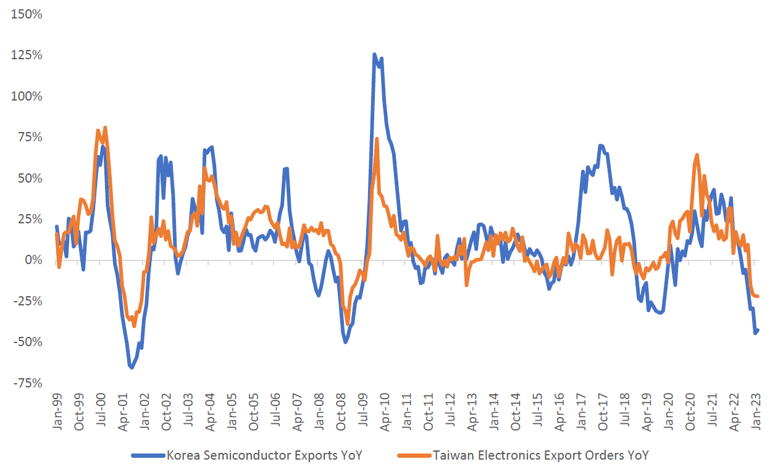Demand for semiconductors is an indicator of the health of the global economy. Right now, things are looking weak as ever.
Key Points
- Analysis of economic conditions and export data shows little evidence of recovery for Asian tech hardware export markets
- Economic data from South Korea and Taiwan are important indicators of the state of the world economy, as both countries are major exporters of various goods
- Earnings expectations for South Korea and Taiwan are now trending down after being some of the best performing earnings markets during COVID
- Find out about JOHCM Global Emerging Markets Opportunities.
Expectations that South Korea and Taiwan can lead an emerging markets recovery are overdone as both countries continue to face historically weak conditions in their key semi-conductor and electronics export industries, says JOHCM’s James Syme.
Market commentary and analyst recommendations in recent weeks have been weighing the prospects of a return to growth for the key Asian tech hardware export markets.
But an analysis of economic conditions and export data shows little evidence of recovery, with some key metrics as weak as they were during past global recessions like the tech wreck of 2001 and the financial crisis of 2008.

“We’ve seen a lot of a lot of investors go back to the playbook of what worked for the last couple of years — Chinese Internet stocks and Korean and Taiwanese tech hardware names,” says Syme, who co-manages the JOHCM Global Emerging Markets Opportunities.
“But when we look at the data, we see no evidence of that at all.”
South Korean exports of semiconductors were down 42.5 per cent year on year in February. Taiwanese electronics exports fell 22 per cent for the same period.
“We’ve only seen those levels in 2008, 2001 and in 1990,” says Syme.
“It may or may not be the case that the global economy is tipped into recession by Fed interest rate hikes — but looking at the current state of the tech hardware industry, it looks and feels like there’s a major recession.
“It might be that we’re seeing the tail end of a drop off in the developed world before China recovers, but our process is based on looking at what’s happening, not imagining what might happen — and when we look at what’s happening, things are difficult.”
Syme says one key indicator — the number of days of inventory in the global semi-conductor industry — has “exploded higher, even to way above where it was in the bad days of ‘08”. That implies reduced demand while this inventory bulge is worked through.
Economic data from South Korea and Taiwan are important indicators of the state of the world economy. Both countries publish a good amount of data with long time series, which can be used as a benchmark for global demand.
South Korea is a major exporter of cars, machinery and steel. Taiwan is a leading exporter of semiconductors and electronics.
Overall exports for South Korea were down 7.5 per cent in the year to February, while Taiwan’s exports fell 17 per cent over the same timeframe.
Exports are not the only indicator of tough economic times.
Purchasing manager surveys in both countries show expectations of contraction. Korean industrial production in January showed a disappointing 12.7 per cent contraction, while Taiwan’s industrial production fell 10 per cent in February to be down 21 per cent year on year.
“It’s just a really weak set of data,” says Syme.
“Now, things could recover from here, but a lot of the mood around technology right now looks difficult.
“There’s a bit of hope that AI products like ChatGPT will lead to demand for server hardware, but if you look at the startup ecosystem, if you look at demand for tech hardware for crypto mining, and if you look at job moves from the global scale players like Amazon, Microsoft, Google and Netflix, it looks really difficult.”
Syme says earnings expectations for South Korea and Taiwan are now trending down after being some of the best performing earnings markets during COVID.
“Despite a recovery in China and ongoing growth in other major economies like India or Indonesia, we think it’s far too soon to be looking for Taiwan and Korea to lead.”
Instead, Syme says investors should stick to the emerging markets that are suited to current global economic conditions.
“Mexico continues to deliver in terms of exports and remittances. And Poland, Hungary and Czech are looking a lot better than a year ago.
“So, you wouldn’t say that it’s all red lights in terms of the outlook for the global economy — it’s sector specific.
“There’s an enormous shortage of people in the United States who are able and willing to drive trucks and serve food and clean and build things — that it is an enormous opportunity for Mexico, which is a supplier of people who can do that.
“The developed world has a shortage of labor — but there’s no shortage of DRAM or NAND flash or CPUs or GPUs.”
Source: Bloomberg/JOHCM. The fund as of April 2023 does not hold any of the securities mentioned.
